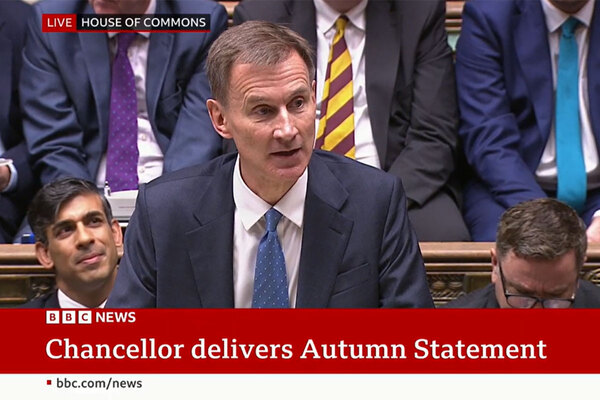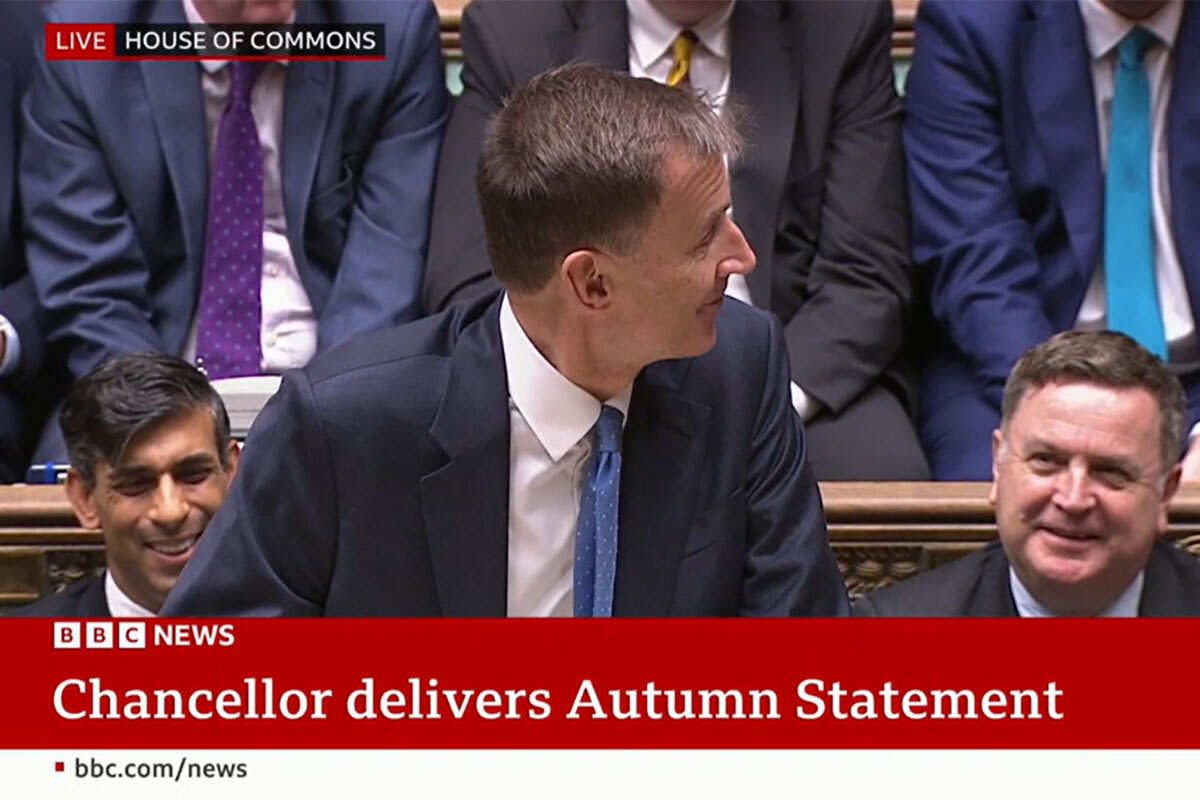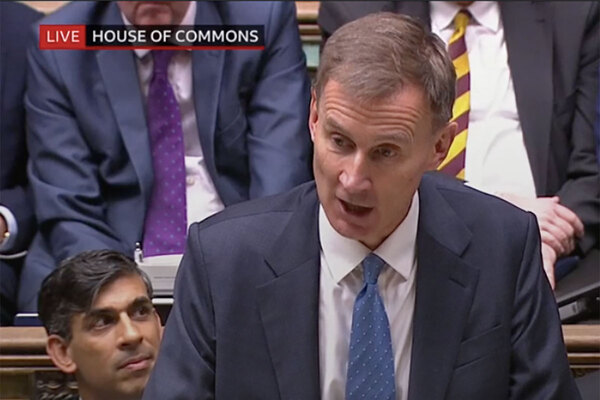You are viewing 1 of your 1 free articles
Autumn Statement 2023: the sector responds to Jeremy Hunt’s housing announcements
Today, the chancellor confirmed Local Housing Allowance will be unfrozen, alongside plans for nutrient-neutrality mitigation and some new funding. Here, the sector responds.
Gavin Smart, chief executive of the Chartered Institute of Housing (CIH):
“We are delighted to see the government listening to the concerns of CIH and the wider sector and announcing the uprating of the Local Housing Allowance (LHA).
“This measure alone won’t solve the housing and homelessness crisis. But in the face of rising rents, ever-increasing numbers of families living in temporary accommodation and the lack of social housing, restoring the link to the 30th percentile and the commitment to uprate benefits by the September inflation figure will make a big difference to those struggling the most.”
Fiona Fletcher-Smith, chair of the G15 network and chief executive of L&Q:
“The chancellor’s confirmation that benefits will be uprated in line with September’s inflation figure is very welcome. This will ensure more households are protected from the very worst of the financial pressures they are currently having to bear.
“We are also pleased that LHA will be restored to the 30th percentile, as the G15 called for. Uplifting LHA rates to current levels will reduce the affordability gap and prevent immediate and avoidable hardship for private renters.
“Notable in its absence from the Autumn Statement was any mention of additional measures to support the decarbonisation of Britain’s housing stock. We know that retrofit solves more than just the climate challenge, with a multitude of benefits stretching from lower bills for residents to economic opportunity for the country.
“Housing associations are, on average, more energy efficient than any other homes, but we need long-term policy certainty if we are to reach net zero by 2050.”
Kate Henderson, chief executive of the National Housing Federation:
“The chancellor’s decision to unfreeze Local Housing Allowance is one we’ve long been calling for, and will mean that people at the sharp end of the housing crisis will be helped to keep up with increasing rents. This action, along with the decision to uplift benefits payments in line with inflation, will give millions of people struggling with living costs some much needed relief. However, we’re concerned that tougher rules and potential benefit reductions for people who are unable to find a job will result in increased hardship.
“We also welcome the additional £3bn for the Affordable Homes Guarantee Scheme which can be accessed to finance works to improve the quality of existing homes as well as for new much needed affordable housing.
“It is hugely disappointing that the government has not used this Autumn statement to release the full £3.8bn Social Housing Decarbonisation Fund. This will impact on housing associations’ ability to make homes energy efficient at scale and pace, saving residents money and helping to alleviate fuel poverty, creating thousands of jobs and decarbonising our homes. We urge the Government to bring this funding forward soon as possible and before the Spring Budget.
“Increased investment in planning capacity is the right thing to do. However, the money should be ringfenced and have greater flexibility so it succeeds in removing barriers to the delivery of thousands of homes stuck in the planning system."
Tracy Harrison, chief executive of the Northern Housing Consortium:
“We warmly welcome the chancellor’s decision to uprate LHA for the first time since 2020. With rents across the North rising, the freeze had become unsustainable. I am pleased the chancellor has listened to calls from across the sector to relieve the pressure that had been building on renters and councils across the North.”
Nicholas Harris, chief executive of Stonewater:
“While the chancellor sees some hope for the future of the economy in the form of an unexpected increase in tax receipts and the recent reductions in inflation, the tax cuts announced today provide little, if any, relief to our customers, whose income is already stretched more than many can manage.
“With only around 56% of social housing currently meeting Energy Performance Certificate Band C, and a reported £2.6bn gap in the government’s committed investment into energy efficiency, we need a guaranteed long-term solution so we can ensure our customers have warm, efficient, safe homes.
“We know that the Social Housing Decarbonisation Fund has already provided much-needed funding for a range of projects across the country, but we believe that the announcement of Wave 3 should be accelerated, and all remaining funds should be released so that momentum is not lost.”
Carol Matthews, chief executive of Riverside:
“We welcome the government’s move to unfreeze housing benefit. Maintaining the freeze on the housing allowance was driving more people into homelessness at a time when we have a record high of 104,510 households living in temporary accommodation in England and councils collectively spending £1.7bn on temporary accommodation in the past financial year to keep families off the streets.
“We also welcome the government’s commitment to making long-term decisions for a brighter future and we urge them to commit to a long-term strategy for housing so we can see an end to the housing and homelessness crisis we now face.
“The lack of housing means an increasing number of people cannot afford housing and an increasing number of councils cannot afford the bill for temporary accommodation to house people in need. This is also bad news for the taxpayer, as temporary accommodation is much more expensive than permanent, high-quality social housing.
“There is a clear long-term need for the government to commit to delivering more than 90,000 new homes a year for social rent and to ring-fence and increase long-term revenue funding for supported housing for people affected by homelessness. We will continue to urge all political parties to commit to build and fund more social and supported homes, which are desperately needed across the country.”
Phil Andrew, group chief executive of Orbit:
The 6.7% increase in Universal Credit and benefits is welcome, as is the 8.5% increase in pensions at a time when the cost of living crisis continues to significantly impact our customers and residents. However, these measures won’t kick in until April 2024. It’s really disappointing to see such little immediate financial help from HM Treasury, especially in relation to energy bills.
“Our research with Orbit customers showed that 72% said they had turned their heating off completely to save money during the winter months. People need help and they need it now.”
Mark Washer, chief executive of Sovereign Network Group:
"Without the foundation of a good, affordable home, people simply won’t have the energy the chancellor spoke of to grow the economy. The government is heading in the right direction with funding for planning and planners, and the doubling of the affordable homes guarantee scheme, but these remain a drop in the ocean against what is needed to deliver the places people need across the country.
"Whoever forms the next government must make a long-term plan for good homes a priority. We need a long-term settlement on rents, wholesale planning reform and further investment in the planning system. This will give us the confidence to invest more in providing good, affordable homes, improving lives, raising productivity and reducing reliance on the public purse.”
Claire Holland, acting chair of London Councils:
“Boroughs will continue to face massive budget pressures. Many are struggling to balance their budgets, and the Autumn Statement leaves them teetering on the edge.
“London’s homelessness emergency is a key concern. After years of campaigning for an increase in LHA, we welcome the decision to end the freeze. Boosting LHA is essential for helping low-income Londoners pay their rent and avoid homelessness. This is good news for London renters and for boroughs’ hard-pressed homelessness services.
“But with one in 50 Londoners currently homeless and living in temporary accommodation arranged by their local borough, the housing crisis remains a critical risk to town-hall budgets. Enormous and growing pressures can also be seen across other vital services, especially adult and children’s social care.
“We will keep pushing for more funding support in the face of these ongoing challenges, as well as the long-term reforms to local government finance that are crucial for sustaining London’s local services in the years to come.”
Matt Downie, chief executive of Crisis:
“Today’s announcement to increase housing benefit is, in the short term, the single biggest step the chancellor could take to prevent and end homelessness for tens of thousands of households.
“One point eight million private renters currently receive housing benefit in England alone, yet our research with Zoopla shows that just 5% of properties in Great Britain are affordable for them. We’re pleased the chancellor has finally listened to calls from the homelessness sector and councils and taken action to prevent more hardship.
“While the chancellor’s decision to tackle homelessness in the short term is a positive step, there is no room for complacency. The next UK government must sustain this investment, otherwise we will see homelessness rise again.”
Polly Neate, chief executive of Shelter:
“Homelessness is at a record high and unfreezing housing benefit to cover the bottom third of local rents is an essential lifeline to keep people in their homes. However, pushing this to April 2024 will leave many families facing an uncertain winter, with the threat of homelessness and spending their Christmas in grotty, one-room temporary accommodation looming large.
“We are pleased that the chancellor has listened and taken a crucial step to stop rising homelessness, but we urge the government to bring this decision forward and unfreeze housing benefit immediately.”
Tom Nicholson, senior advisor at Outra and former chief operating officer at Crest Nicholson:
“Hearing the chancellor address the planning backlog today was somewhat promising, but we need to see the ‘meat in the sandwich’ to verify if it’s genuine reform.
“The housing crisis isn’t just about numbers; it’s about overcoming systemic hurdles. The persistent planning backlog stalls meeting housing needs. We must bridge intentions with actions for tangible change.
“A robust framework is essential, with mandatory housing targets for local plans, streamlining planning, reducing risks and enabling prompt home construction. True reform means navigating regulations, wisely allocating resources and fostering stakeholder collaboration. This creates an environment for swift housing development, meeting the UK’s urgent needs.”
Olivia Harris, chief executive of Dolphin Living:
“The challenges of renting within London have never been greater, especially for those critical workers who support our public services and are at the forefront of driving the economic growth we desperately need.
“While increase to the national minimum wage and other measures are welcome, housing costs simply remain far too high and are only likely to increase as supply dwindles with the collapse in new housing starts in London.
“What we really needed was a targeted investment package matched by private sector funding to deliver a programme of discount to market rented accommodation to support economic recovery and build London’s attractiveness for key industry sectors, such as life sciences, by increasing the attractiveness of the city for workers on all income levels.”
Marc Vlessing, chief executive of Pocket Living:
“With nearly 25% of young Londoners openly admitting in our recent research that they will be forced out of the capital due to high housing costs, the lack of affirmative action to support small and medium-sized enterprise (SME) developers and get builders building in today’s Autumn Statement is palpable.
“According to the latest data, construction starts in London are at the lowest point since 2009. Consequently, the industry is in dire need of support. Considering the chancellor’s focus on supply-side measures, this was an ideal chance to provide this backing as well as be radical and listen to those 66% of Londoners aged 25 to 45 who would have welcomed development on the green belt if it meant more homes.
“As a representative of the SME sector, it is therefore disheartening to see our suggestions for supply-side interventions – proposals that could potentially unlock an additional 1.6 million new homes, at no extra cost to the Treasury – overlooked once more.”
Sally Thomas, chief executive of the Scottish Federation of Housing Associations:
“It’s positive to hear the chancellor confirm that social security will be uprated in line with inflation, as well as unfreezing LHA rates, as we know that the cost of living crisis is still hitting people hard.
“But we also hear directly from our members about the scale of need that social tenants are facing, and we need to go further to address it. That’s why we’ll continue to call for more substantial reforms to Universal Credit, to ensure that no one should be facing a winter where they struggle to eat or heat their homes.”
Greg Reed, group chief executive of Places for People:
“The increase in Local Housing Allowance, as well as other benefits, is positive, but it took far too long to get here. LHA rates have been frozen for three years, whilst private rents have skyrocketed. A lack of action on this until now has piled pressure on private renters, significantly contributing to increasing levels of homelessness which in many cases ends up costing the state more when people end up in temporary accommodation. Local authorities and housing associations simply do not have the resources to plug the gap.
“I’d really hoped government would be releasing the full remaining Social Housing Decarbonisation Fund beyond 2025 today. This funding is crucial for us to kick on and retrofit more homes, and bring down bills as a result. Given the scale and urgency of this task nationally, we need more certainty around when the funding will be available so we can plan, alongside other affordable housing providers and the supply chain, to deliver the best outcome for people and the environment. Today is a missed opportunity.”
Amanda Williams, chief investment officer at Aster Group:
“We’re encouraged to hear the renewed commitment to reform the planning system to ‘guarantee’ faster timelines, including additional funding to tackle backlogs in local planning authorities. The £110m investment into nutrient mitigation schemes will go some way to supporting the sector as we play our part in tackling the chronic housing shortage. That said, we’ll want to see the detail behind both announcements to understand the extent of their potential impact from a housing development perspective.
“The housing crisis also requires another rethink in terms of supply though. As conditions improve, it will be important to see consideration given to supporting alternative delivery options, such as community land trusts (CLTs), which can help tackle the lack of affordable housing while being sensitive to the needs of local communities.
“Similarly, in relation to home ownership, the extension of the Mortgage Guarantee Scheme to the end of June 2025 will undoubtedly help support those trying to get on the housing ladder."
Geeta Nanda, chief executive at Metropolitan Thames Valley Homes:
“The unfreezing of Local Housing Allowance is a welcome step which will help to alleviate pressure on thousands of renters for whom rising rents and cost of living pressures have had the most profound impact. We also welcome additional steps to support those at the sharp end of the cost of living crisis including increasing Universal Credit and the National Living Wage rise in the state pension will certainly be welcomed by older residents.
"We are once again left disappointed by the lack of long-term ambition shown by the government to tackle the housing crisis, one of the greatest challenges of our time. Whilst important that the government recognises the problems being caused by the planning backlog, we are concerned that today’s announcement is a drop in the ocean when considering the cost of the system. Without a long-term strategy backed by sufficient investment, a safe, secure, and affordable place to call home will become an ever more distant dream for a growing number of people including those who aspire to own their own home.”
Hannah Langford, partner at Devonshires:
“A faster planning process is of course welcome. But with increasing construction costs, a skills shortage in the industry and the other regulatory constraints making social housing developments less viable, our clients are unlikely to see the benefits of the Chancellor’s measures. Given the scale of the housing crisis at the moment, especially within social housing, a target of 2,400 new homes is unlikely to have a signification impact.”
Sign up for our daily newsletter
Already have an account? Click here to manage your newsletters












